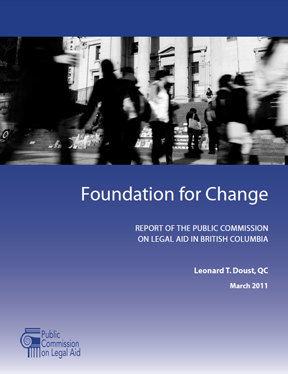Yesterday, the Public Commission on Legal Aid in British Columbia released its report and probably to no one’s surprise said the B.C. legal aid system has been so denuded that it can’t provide even the most basic services.
“Today, the legal aid system operates in a severely circumscribed environment,” writes commissioner and prominent lawyer Len Daoust. “Based on the evidence presented to me, I cannot come to any conclusion other than the services provided in British Columbia today are too little, their longevity or consistency too uncertain. This result is the consequence of the cutbacks and lack of sufficient and consistent financing, even though [the Legal Services Society] has done its very best, and in my view has done everything possible, to accommodate the needs within their limited budgetary restrictions.
Daoust made seven overarching findings:
• The legal aid system is failing needy individuals and families, the justice system, and our communities.
• Legal information is not an adequate substitute for legal assistance and representation.
• Timing of accessing legal aid is key.
• There is a broad consensus concerning the need for innovative, client-focused legal aid services.
• Steps must be taken to meet legal aid needs in rural communities.
• More people should be eligible for legal aid.
• Legal aid should be fully funded as an essential public service.
In light of those findings, Daoust made a series of recommendations to improve legal aid, the most obivious of which is to increase funding, which B.C.’s Attorney General Barry Penner was quick to say was unlikely. “Virtually every other ministry, outside health and education, have had their spending reduced, as we struggle to balance the budget,” he said. “Interest groups all say they’d like to see more money spent by governments on legal aid, but the public has a reluctance to spend more on taxes.”
He told The Vancouver Sun: “At first blush, many of the ideas sound nice and would be nice to do, but the challenge is determining what is realistic considering the competing priorities of government.”
Daoust makes nine recommendations for improving legal aid services and goes into great detail about all of them in the heart of his 68-page report “Foundation for change”:
• Recognize legal aid as an essential public service.
• Develop a new approach to define core services and priorities.
• Modernize and expand financial eligibility.
• Establish regional legal aid centres and innovative service delivery.
• Expand public engagement and political dialogue.
• Increase long-term, stable funding.
• The legal aid system must be proactive, dynamic, and strategic.
• There must be greater collaboration between public and private legal aid service providers.
• Provide more support to legal aid providers.
Daoust says even though he took on his fair share of legal aid cases while practising, the 11 hearings and 80 submissions he received as commissioner really opened his eyes. He says while the whole system is essentially broken, “the needs are greatest and have the most serious consequences in family law, in child protection, and in poverty law matters where individuals have unresolved legal problems that affect their ability to meet their basic needs for housing and subsistence.”
Mark Benton, executive director of the Legal Services Society, said it endorses the conclusion that the current scope and availability of legal aid in B.C. does not meet the need, and endorses the recommendation that legal aid be recognized as an essential public service and be better funded.
However, he noted, “Many of the concerns mentioned in the report have been addressed including the restoration of many services. LSS also established in 2010 a new community engagement department to ensure legal aid services meet local needs particularly in rural and remote communities.”
He said the report is based on submissions from the public that, as a disclaimer in the report admits, have been taken at “face value,” and not reviewed in light of LSS polices. Thus quite a bit of information in the report does not necessarily reflect the current state of legal aid in the province.
Benton pointed out the LSS was not part of the commission, which was a joint initiative of the Canadian Bar Association B.C. branch, the Law Society of B.C., the Law Foundation of B.C., the B.C. Crown Counsel Association, the Vancouver Bar Association, and the Victoria Bar Association. “None of these organizations is responsible for the delivery of legal aid.”
Penner also said he expected more hard data and less anectodal evidence to be used to come to conclusions about the state of legal aid.
Read more about the sad state of legal aid across the country in Canadian Lawyer’s October 2010 cover story “Legal aid: a system in peril.”

“Today, the legal aid system operates in a severely circumscribed environment,” writes commissioner and prominent lawyer Len Daoust. “Based on the evidence presented to me, I cannot come to any conclusion other than the services provided in British Columbia today are too little, their longevity or consistency too uncertain. This result is the consequence of the cutbacks and lack of sufficient and consistent financing, even though [the Legal Services Society] has done its very best, and in my view has done everything possible, to accommodate the needs within their limited budgetary restrictions.
Daoust made seven overarching findings:
• The legal aid system is failing needy individuals and families, the justice system, and our communities.
• Legal information is not an adequate substitute for legal assistance and representation.
• Timing of accessing legal aid is key.
• There is a broad consensus concerning the need for innovative, client-focused legal aid services.
• Steps must be taken to meet legal aid needs in rural communities.
• More people should be eligible for legal aid.
• Legal aid should be fully funded as an essential public service.
In light of those findings, Daoust made a series of recommendations to improve legal aid, the most obivious of which is to increase funding, which B.C.’s Attorney General Barry Penner was quick to say was unlikely. “Virtually every other ministry, outside health and education, have had their spending reduced, as we struggle to balance the budget,” he said. “Interest groups all say they’d like to see more money spent by governments on legal aid, but the public has a reluctance to spend more on taxes.”
He told The Vancouver Sun: “At first blush, many of the ideas sound nice and would be nice to do, but the challenge is determining what is realistic considering the competing priorities of government.”
Daoust makes nine recommendations for improving legal aid services and goes into great detail about all of them in the heart of his 68-page report “Foundation for change”:
• Recognize legal aid as an essential public service.
• Develop a new approach to define core services and priorities.
• Modernize and expand financial eligibility.
• Establish regional legal aid centres and innovative service delivery.
• Expand public engagement and political dialogue.
• Increase long-term, stable funding.
• The legal aid system must be proactive, dynamic, and strategic.
• There must be greater collaboration between public and private legal aid service providers.
• Provide more support to legal aid providers.
Daoust says even though he took on his fair share of legal aid cases while practising, the 11 hearings and 80 submissions he received as commissioner really opened his eyes. He says while the whole system is essentially broken, “the needs are greatest and have the most serious consequences in family law, in child protection, and in poverty law matters where individuals have unresolved legal problems that affect their ability to meet their basic needs for housing and subsistence.”
Mark Benton, executive director of the Legal Services Society, said it endorses the conclusion that the current scope and availability of legal aid in B.C. does not meet the need, and endorses the recommendation that legal aid be recognized as an essential public service and be better funded.
However, he noted, “Many of the concerns mentioned in the report have been addressed including the restoration of many services. LSS also established in 2010 a new community engagement department to ensure legal aid services meet local needs particularly in rural and remote communities.”
He said the report is based on submissions from the public that, as a disclaimer in the report admits, have been taken at “face value,” and not reviewed in light of LSS polices. Thus quite a bit of information in the report does not necessarily reflect the current state of legal aid in the province.
Benton pointed out the LSS was not part of the commission, which was a joint initiative of the Canadian Bar Association B.C. branch, the Law Society of B.C., the Law Foundation of B.C., the B.C. Crown Counsel Association, the Vancouver Bar Association, and the Victoria Bar Association. “None of these organizations is responsible for the delivery of legal aid.”
Penner also said he expected more hard data and less anectodal evidence to be used to come to conclusions about the state of legal aid.
Read more about the sad state of legal aid across the country in Canadian Lawyer’s October 2010 cover story “Legal aid: a system in peril.”







